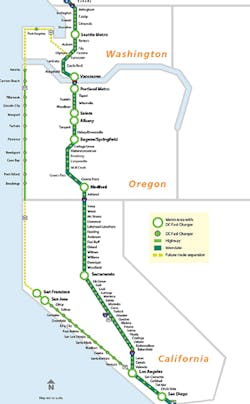EPRI, CALSTART utilizing $13M award to jump-start Freight Carrier Fast-Charging pilot in California
Rod Walton, EnergyTech Senior Editor
Transit electrification begins at home: California state energy leaders are offering financial help to jump-start the plan to electrify zero-emissions freight hauling starting in the Golden State.
The Electric Power Research Institute (EPRI) and nonprofit partner CALSTART were awarded $13 million from the California Energy Commission to lead collaboration on a freight e-mobility charging network. The first phase of the joint effort, called Research Hub for Electric Technologies in Truck Applications (RHETTA) begins this month, according to the participants.
The multi-phase RHETTA project will commence with a community-first engagement framework to ensure that pollution-impacted communities, low-income communities, and tribal communities are involved in creating and guiding the initiative. The first steps include development, testing and implementation of high-power electric vehicle (EV) chargers for trucks near Southern California's two ports.
Related story: Electrify America tops 30 MW in installed Battery storage at EV Charging stations
Subscribe to EnergyTech's free, tri-weekly newsletter for more stories like these
"Electrifying transportation is central to the clean energy transition, and this project has tremendous value in the adoption of electric, zero-emission trucks along one of the heaviest traveled corridors in Southern California," said EPRI President and CEO Arshad Mansoor. "Proven successful, high-power charging could be replicated throughout the country, accelerating the clean energy economy."
The project will work toward developing high-power chargers that can provide 100 miles of range in less than 10 minutes and cost less than $500 per kW. Each pilot site will have two charging units that will serve as demonstrations sites to test and validate their use and impact.
The high-power charging support extending the range of electric trucks and increase their market penetration. The first phase of the project runs through 2025.
RHETTA partners range from utilities to research organizations, universities and industry, including Southern California Edison; Southern California Association of Governments; GRID Alternatives; Cambridge Systematics, Inc.; Burns & McDonnell Engineering Company, Inc.; Momentum; ORBCOMM, Inc.; GNA; Paul International; MMX, LLC; and TravelCenters of America, LLC, as well as world-class labs and universities -- including Lawrence Berkeley National Laboratory, DOE National Renewable Energy Laboratory, and University of California, Riverside.
A consortium of West Coast electric utilities have mapped a future fast-charging infrastructure network for freight carriers moving up and down the Interstate 5 corridor. Those include SCE, Sacramento Municipal Utility District, Pacific Power, Puget Sound Energy, Pacific Gas & Electric, Seattle City Light, Pacific Gas & Electric and others.
The map of the so-called West Coast Clean Transit Corridor is pictured at the top of this story.
CALSTART is a nonprofit seeking emissions reduction tranportation solutions across the economy. Members include representatives from the U.S. Department of Transportation, UPS, Ford Motor Co., Cummins and numerous other companies and statewide and national entities.
